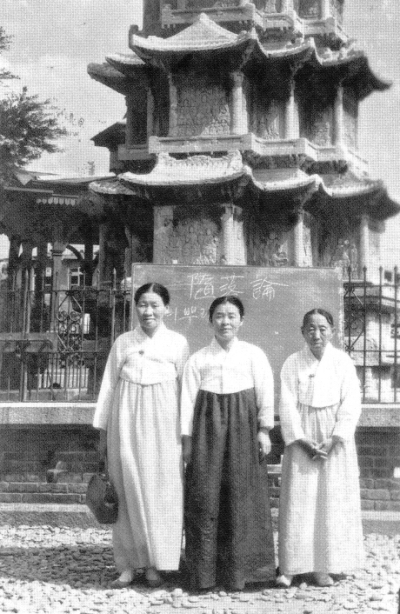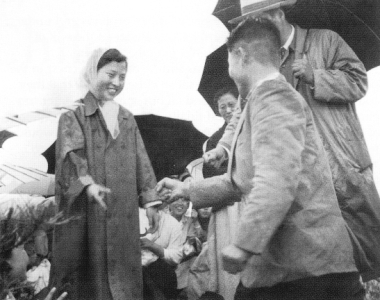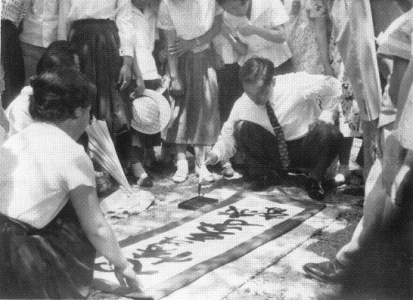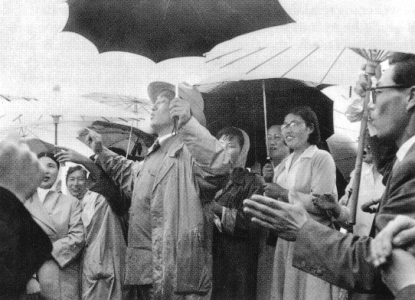![]()
The Words of the Kim Family after 2009
|
|
The Words of the Kim Family after 2009 |

Witnessing
in Pagoda Park, central Seoul, in 1960. From left: Kim Hee-ok, Kang
Hyun-shil, Jeong Seok-on
On July 3, 1960, after an afternoon Sunday service, True Father announced that the second round of the forty-day summer witnessing would be carried out in more than three hundred and sixty Korean regions from July 20. The campaign was originally termed the "second summer witnessing period." In the end, however, the 1957 witnessing was viewed as having been preparatory and experimental, and the 1960 summer witnessing campaign was considered the actual proclamation of the Divine Principle. It is now officially referred to as the first forty-day enlightenment) witnessing period.
At the time, the campaign itself seemed an impossible one, considering the number of followers and the situation of the church. There just wasn't enough manpower, church funds or energy. The early members preferred to maintain the status quo. The new members were hard put just to overcome persecution and hardships and to learn the Divine Principle and adapt it to their everyday lives. In spite of all this, True Father made the decision to launch the campaign, which came as a thunderbolt to all the members.
Thus, on July 6, 1960, details of the witnessing campaign were sent out by official notice to all churches in Korea. On the morning of July 17, 450,000 leaflets printed in tabloid form on both sides and 18,000 large posters based on the theme "Declaration of the Principle," were distributed among sixty churches nationwide.
On July 20, three days later, 659 witnessing members were dispatched to 413 regions throughout Korea, individually, in pairs, or in trinities. They resolved not to fail but to emerge as victors. Members were curious about the new places they would see, and set out with a sense of adventure on this, the first summer enlightenment witnessing campaign of the seven-year course.
Fortunately, all schools were having their summer break and the weather was hot. From the political viewpoint, Korea had put the April 19 Revolution behind her and was only ten days away from the July 29 general elections. The situation at the time provided the best opportunity for the members to spread the new word and share their hearts, which were overflowing with the Holy Spirit.
Everyone, including True Parents, whether they had gone out witnessing or had chosen to stay at home and witness from there, ate boiled barley for forty days. The witnessing members, armed with nothing more than the Divine Principle, were dispatched throughout Korea. Needless to say, they had to overcome all kinds of hardships and endure persecution and oppression. Unification Church signboards appeared all over the country, and the witnessing campaign proved what True Father had said, "Those who triumph over a thousand hardships are enthroned as kings of glory."
The witnessing campaign was a two-sided educational program that brought together the enlightenment movement to awaken people's intellectual wisdom, while the Divine Principle developed their internal wisdom.
True Father encouraged members to "step forward with the iron rod of life to lead the Korean people, who were in constant struggle because they did not know which way to go." He added that the work begun during his lifetime would be remembered by innumerable people and that they would make barefoot pilgrimages to see its fruits.

Rock,
scissors, paper on a church outing in 1960; the third player, at
back, is True Father
Mr. Byeong-shik Kim, who was assigned to a village in Gyeong-gi Province, visited every one of the three hundred some houses in the village to distribute the first Unification Principle leaflet, The Way of Unification." He gave a simple explanation and asked people to come to listen to a talk on the Divine Principle at the Rail Workers' Union Hall. The leaflet read in part, "Listen! Just come and hear the word! Our brethren, we ask you all to come and listen! The 2.8 billion people of the world are growing weary of being fenced in by historical suffering and are succumbing under the weight of the dismal reality, but the new word of God that can save you from the brink of death has been prepared for you..." These leaflets overflowing with the energy of life were delivered to each household in the region without exception.
Mr. Gyu-mun Yim, who witnessed in the mining district of Hambaek, said of his experience that all that God gave him were prayers offered in tears. He stayed up all night alone just saying "Father!" His tearful prayers gave him solace and hope. Gyu-mun could sympathize with Jesus, who had lamented, "Foxes have holes and birds of the air have nests, but..." Thinking about True Father's heart at the time of the mud but in Beomnaetgol, he realized how lonesome was the path toward God. He could not stop tears falling from his eyes, and his body heated up until he felt that he could not endure the intense, feverish heat. At that moment, God instructed him to find his way to a particular house with a large, old tree. When Gyu-rnun explained to the owner of the house the purpose of the enlightenment movement, the owner welcomed him, moved his boarder to another house and let Gyu-mun stay in the vacated room. Every morning, he woke up early, and hung up posters around the town. He had selected two locations for speaking. He walked around town night and day, stopping to give talks. In the morning he drank cold water and relied on others for his lunch and dinner.
Miss Boon-jo Kim, who set out to witness for three years in her mission place, Gampo in North Gyeongsang Province, exhausted all her food supplies. She went to the seaside, plucked wild sea# weed, put it in a bowl of water and drank it as a meal. After subsisting on this for a few days, Boon-jo hardly had the strength to stand. She approached the door of a house and a girl ran out to welcome her. The girl told her that her deceased grandfather had appeared to her in a dream and told her that an important guest would come to her house the next day; he asked her to serve the guest well. She also said that she had seen Boon-jo in the dream.
She served her rice and pork stew. At that, tears flowed from Boon-jo's eyes. She would later receive barley from many homes in the town. In her excitement, Boon-jo could disregard her hunger.
Miss Myeong-jin Seo, who went to Yeonsan in South Chungcheong Province, did her very best, and resolved that her bones would be buried in her mission place. During the day she helped others with their work and also visited every house in town. As the forty days were drawing to an end, Myeong-jin rented an empty building and taught the Divine Principle to adults and young people every night. She found that though she was only eating barley, she was overflowing with energy, and realized that God was indeed with her. She achieved the extraordinary feat of bringing forty people to join the church.
Miss Geum-rang Kim, who went out to pioneer Hwangdeung in North Jeolla Province, walked along the footpaths between the rice fields carrying a blackboard and a water pitcher and gave lectures in little pavilions where farmers rested. On her way to and fro, gusts of wind would blow chalk powder into her eyes and mouth. Geum-rang also gave lectures to students under a big tree and witnessed by visiting homes. Everyone received her kindly. Her first spiritual child was a high school student. When stories about her got around, people whom Geum-rang hadn't visited actually complained that she hadn't come. When she left, they everyone came aboard the train to see her off.

June
1960: Father writes a message, an early one in a long tradition of
conveying key concepts through calligraphy.
Im-yul Rah was dispatched to Ulreung Island, where he had to endure difficult environmental conditions and extreme persecution. At times during prayer, lm-yul did nothing other than cling to God and struggle in inner torment. Thinking about God and True Parents' mortifying and grievous histories, he felt as much pain as if his own flesh and bones were being torn apart. He wept until his handkerchief and his lap were soaked in tears. Im-yul lamented the fact that people were so ignorant and disbelieving that they refused to receive the precious new truth. Some days, Im-yul was so moved and in tears when he visited people's homes that he could only witness to them after he had calmed down a little. In the end, however, his efforts paid off -- he brought many significant members into the church. Eventually, he established a church there.
Mr. Hak-shil Kim, who went out witnessing in North Chungcheong Province, preached for six days until he grew hoarse, but no one joined. On the last day, with only an hour left, Hak-shil wrote with his own blood, while shedding tears, "Young people of Korea, let's fight for the world!" He held the written resolution in his hand and wept endlessly. Hakshil's finger continued to bleed.
At that moment, three university students came up from where they had been sitting and said, "Teacher, we hadn't realized what kind of church this is! We will build a church here." And they bound up his bleeding finger.
Dow-soon Yim, though he'd had to study hard to enter a university, missed the first part of term exams and took part in the enlightenment witnessing in Gangwon Province. He got up early each morning and cleaned the village. During the day, Dow- soon visited people's homes. He also went out into the streets and advertised evening classes. Each night twenty to thirty elementary school, middle school and high school students came to learn from him. In the early morning, they cleaned the village with him.
Mr. Yeong-tae Yun saw a "Declaration of the Principle" poster on a bulletin board right in front of his house. He also read a leaflet his neighbor had received on the street and became interested. That night, he found his way to the lecture room in front of Andong Station and spoke with Mr. Byung-ho Kim, who was the missionary there. From the next evening, for more than thirty days, he listened to the lectures and was deeply touched. He was also impressed by the character and lifestyle of the missionary, and submitted an application to join the church. Though members of a Christian church came to see him several times to dissuade him, Yeong-tae never wavered in his decision.
Mr. Il-seop Eom of Pyeongchang in Gangwon Province, became suspicious of his brother Gi-seop's new religion. He met with the pioneering missionaries and held discussions with them for more than ten days, at the end of which II-seop also decided to join the church. During that time, every night he dreamed that he was reading the Divine Principle. When he woke up each morning and checked the Divine Principle book, what he had read in his dream was on the same pages in the actual book as it had been in the book he read in his sleep.
When he read the Divine Principle book during the day, Il-seop's heart hurt so much that he could not read for long. Though this made him afraid at first, when he heard that the fire in his heart meant he was receiving the grace of God, IIseop felt relieved. Thinking that God had made him and his brother undergo hardships to guide them to the right path, he offered tearful prayers of gratitude.
Ms. Myeong-ok Shim, who worked as the itinerant missionary' for North Chungchung Province, said that when she looked back on those days, she could not see how she had survived the hardships she endured. At the time, however, she lived surrounded by the grace of God and didn't even know whether she was suffering or not. In many places she visited, Myeong-ok saw that the leaders were going hungry because they had nothing to eat. On innumerable occasions, she walked seven, fifteen or even twenty miles in a day. At times, when Myeong-ok stopped at a witnessing center where people had come to hear her speak, she was so exhausted that she almost fainted while speaking to them.
Mr. Hwan-chae Hwang was the regional leader for Jeolla Province at the time. With the transportation money the headquarters provided and some money from his brother, Hwanchae bought a bicycle and rode it around to tour the witnessing centers. In the heat of summer, he would be soaked in sweat and look as if he had just come out of the water. When the members heard that the regional leader was coming to see them, they waited at the entrance to the village from early morning to welcome him. When the members caught sight of Hwan-chae on his bicycle, soaked in sweat, they could not speak but just burst into tears.
As can be seen, there were many cases of spiritual cooperation in all parts of Korea. This was also the case for Mr. Hong-gwon Moon, who spent the time of the witnessing campaign in South Chungcheong Province. Hong-gwon had been staying with the mother of a member, but she asked him to move out because people in the village were persecuting her. That very night she dreamed of her grandfather, who told her that if the missionary left their home, their household would be ruined; he asked her to take good care of the missionary.
One day, a man who, for no reason, had been looking at our church and cursing it, collapsed and died right there and then in the rice paddy where he stood.
Mr. Hyeon-cheol Kim, who established a church in South Chungcheong Province, had a series of impressive experiences. When he got off a bus, a girl in fifth grade ran up to him, grabbed Hyeon-cheol's hand and told him that she had been seeing him in dreams from the past three months and that she had known he was coming on that day. Her father, who was a Methodist pastor's younger brother, had already cleaned a room for Hyeon-cheol's use. Around the time Hyeon-cheol had collected enough people through his volunteer work and witnessing activities to hold Sunday service, the village mayor visited him. The mayor told him that he'd dreamed that his mother had asked the missionary to help him to heal a digestive problem the mayor had been suffering from for seven years. Hyeon-cheol at first refused, but when the village head persisted, the missionary advised the mayor to brush his teeth with salt for seven days and not to spit out the water but to swallow it. This cured his ailment. After that, the mayor and his wife both dreamed of the mayor's mother, who told them that the missionary was even greater than the Buddhist monk they had served for seven years. She told them not to neglect Hyeon-cheol Kim. After that, they provided a new table and plates for his use, and cooked meals especially for him.

True
Father holds an outdoor service with members in late June, 1960
(which in Korea is the rainy season).
Director Yu Kwang-yul of the Cultural Department described the circumstances of Father's tour in his History of the Unification Church: "On the first day, Father set out rather late, and yet he visited Euijeongbu, Cheolwon and Geumhwa. Passing through Idong and Ildong, he traveled at breakneck speed through the regions, visiting Chung Pyung and Gapyeong on his way, and finally rested at Chuncheon. This was not the last time he traveled over such a long distance; he did so very often in the course of his tour."
After that, Father traveled by car to all parts of Korea. He sometimes lay down on a sandy beach and looked up at the Milky Way shining brightly in the dark sky, thinking of the "young ones who were all emaciated like orphans and undergoing many difficulties to spread knowledge of the will of God." He stayed up many nights weeping for them.
Inside the Jeep, which was as stifling as an iron chest in the parching summer heat, people sat so close together that they could feel other's hot breath and all but suffocated. After traveling in this way, they would finally arrive at their destination at the end of the day. Without taking time to rest, they would meet the pioneers, who would pour their hearts out. They would listen to the pioneers never-ending reports and together they would all cry and laugh. These times relieved the fatigue of the travelers like refreshing water from a waterfall.
Mrs. Jeong-soon Choi was one of the main members behind the building of a church in Wonju. She had been assigned to the Gangwon Province Red Cross the year before and had moved to Chuncheon. While working for the church there, she was chosen to attend True Father while he visited on his tour. She recalled the circumstances of that time in the following words: "During the forty days of witnessing, Father also ate nothing but barley and fermented soybeans. Even the American members ate beans and did not sleep on beds. Father came to visit on his tour for the first time, and I felt that we just couldn't serve him barley, so we served him rice instead.
He refused to eat it because it wasn't barley. So I mixed some barley with the rice and served that to him. Again he refused to eat it, because rice was mixed in with it. In the end, he ate powdered roasted barley with water, which was barely a meal, and we didn't eat at all. His next destination was Wonju, so I telegraphed Gwan-hae Kim, who was in charge there, 'Serve Father barley.' That was the most heartrending experience of my life."
Everywhere he visited, Father scolded those who served him rice and ate only barley.
With money they had received from selling their own jewelry, Mrs. Jeong Boon-ok, Mrs. Song Jeong-soon and Mrs. Eul-boon Kim of Jecheon, North Chungcheong Province, prepared a meal with all their heart for True Father, who was on his way there from Wonju. Boon-ok had swept about two kilometers on both sides of the national highway from 4 AM to 9 AM, with only a broom. True Father arrived the moment Boon-ok had finished. Holding both her hands, he asked Boon-ok how many hours she had waited for him, and she burst into tears.
Though they served him lunch, he said that he could not eat it knowing that some members were hungry. He suggested that they take the food to a pioneering church and share it with others. Boon-ok and her husband had prepared w100,000 for True Father, whose funds were running low at the time, so he accepted it and put the money to good use.
Mr. Park Jong-gu, who'd been dispatched to Janghang, gave lectures continuously on a roadside for a few days. After that, he visited other towns to witness and to give lectures to members of other churches. During that time, Jong-gu went to see True Father in Pangyo, and when he came back he was so invigorated that he was able to work even more zealously.
Ms. Jang Deok-hee, who received True Father at Haenam in South Jeolla Province, could not find a suitable place for the meeting, so they used a member's daughter's home. After True Father left, Deok-hee touched the walls of the house and wept. Her grief knew no bounds because she had received him at such a small and shabby place. Afterward, she went through all the side streets in the village and beseeched God, and in the end she was able to rent a room.
Boon-jo Kim, who was present when True Father visited Gyeongju on his tour, said that on the evening of True Father's arrival, Father spoke seriously until midnight to those who had come to listen to him on the sands of Gyeongju about the significance of the three-year witnessing campaign and that Father had slept there that night. The members, who had meeting for the first time in a long time, stayed up the whole night exchanging stories with one another. True Father personally handed out transportation money to each of the members and encouraged them to continue to fight for the providence. He then left for his next destination.
Mr. Park Jeong-min, who pioneered in Ulsan while staying on the second-floor of Mr. Jeong-eun Kim's house, witnessed to agricultural school students. Together they then witnessed using a megaphone on a roadside. They also witnessed in government buildings and schools. More than ten people--some of them housewives--joined the church, and many students also. They officially launched a students' association and carried out activities together.
When True Father came to visit them on his tour, they were overjoyed and excited to see him, as if he were their long lost father.